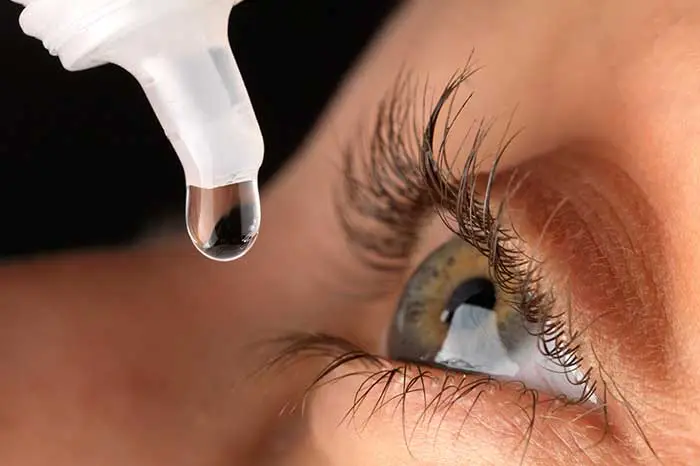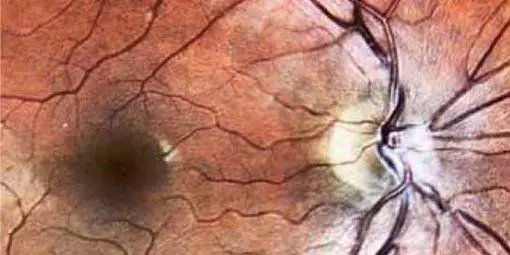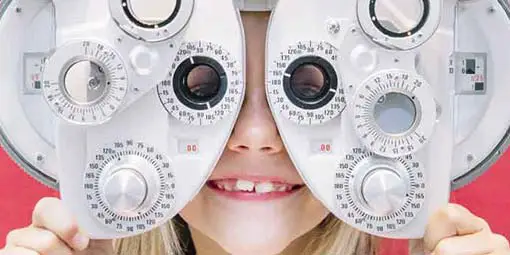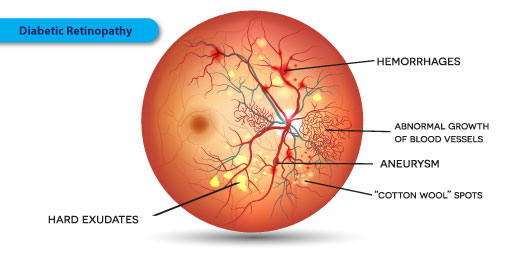Diabetic Retinopathy - Symptoms, Causes and Treatment
07-04-2024
What is Diabetic Retinopathy?
Diabetic retinopathy is a serious eye condition that can affect individuals with diabetes. It specifically impacts the retina, the light-sensitive tissue at the back of the eye. Over time, high blood sugar levels can damage the blood vessels in the retina, leading to vision problems and potential vision loss. Regular eye exams are crucial for individuals with diabetes to monitor for signs of diabetic retinopathy and prevent complications.What Are The Causes Of Diabetic Retinopathy?
Diabetic Retinopathy is caused by damage to the blood vessels in the retina as a result of high blood sugar levels. When blood sugar levels are consistently elevated, it can lead to weakening and leaking of the blood vessels in the retina, causing swelling and fluid buildup. This can result in decreased blood flow to the retina, leading to the growth of abnormal blood vessels or scar tissue. Over time, these changes can lead to vision loss if left untreated.What Are The Risk Factors For Diabetic Retinopathy?
There are several risk factors for diabetic retinopathy that individuals should be aware of. These include having uncontrolled blood sugar levels, a long duration of diabetes, high blood pressure, high cholesterol, pregnancy, and smoking. Additionally, individuals with a family history of diabetic retinopathy are also at an increased risk for developing the condition. It is important for those with diabetes to regularly monitor their blood sugar levels and blood pressure, as well as maintain a healthy lifestyle to help reduce their risk of diabetic retinopathy. Regular eye exams with an optometrist are also crucial in detecting and managing diabetic retinopathy.What Are The Symptoms Of Diabetic Retinopathy?
Patients with diabetic retinopathy may experience a range of symptoms that can affect their vision. These symptoms can include blurry or distorted vision, floaters or spots in their field of vision, difficulty seeing at night, and fluctuating vision. In more advanced stages of the disease, patients may also experience sudden vision loss, dark spots or empty areas in their vision, or even complete blindness. It is important for individuals with diabetes to regularly visit their eye doctor for comprehensive eye exams to monitor for any signs of diabetic retinopathy and to promptly address any changes in their vision.How is Diabetic Retinopathy Diagnosed?
Diabetic Retinopathy is diagnosed through a comprehensive eye exam that includes a visual acuity test, dilated eye exam, tonometry, and optical coherence tomography. During a dilated eye exam, the optometrist will use special eye drops to dilate the pupils, allowing for a better view of the retina and optic nerve. The optometrist will then examine the retina for any signs of damage or abnormal blood vessels. In some cases, imaging tests such as optical coherence tomography (OCT) may be used to provide detailed images of the retina and help in diagnosing and monitoring the progression of diabetic retinopathy. Regular eye exams are essential for detecting and managing diabetic retinopathy in its early stages.
How is Diabetic Retinopathy Treated?
Diabetic Retinopathy can be treated through a variety of methods, depending on the severity of the condition. One common treatment option is laser therapy, where lasers are used to seal off leaking blood vessels or shrink abnormal blood vessels. Another treatment is injections of anti-VEGF medications, which can help reduce swelling and prevent the growth of abnormal blood vessels. In some cases, surgery may be necessary to remove blood or scar tissue from the eye. It is important for patients with Diabetic Retinopathy to closely monitor their blood sugar levels and blood pressure, as well as attend regular eye exams to catch any changes in their condition early on.Is There A Cure For Diabetic Retinopathy?
Unfortunately, there is currently no cure for Diabetic Retinopathy. However, there are treatments available that can help manage the condition and prevent further vision loss. It is important for individuals with diabetes to closely monitor their blood sugar levels and visit their eye doctor regularly for comprehensive eye exams to catch any changes in their retinal health early on. By working closely with a healthcare team, individuals with Diabetic Retinopathy can help maintain their vision and overall eye health.How Can Diabetic Retinopathy Be Prevented?
Diabetic Retinopathy can be prevented by effectively managing diabetes through regular monitoring of blood sugar levels, maintaining a healthy diet, staying physically active, and taking prescribed medications as directed by a healthcare provider. It is also important for individuals with diabetes to attend regular eye exams with an optometrist to monitor for any signs of diabetic retinopathy and catch any changes early on. Additionally, avoiding smoking and managing other health conditions, such as high blood pressure and cholesterol levels, can help reduce the risk of developing diabetic retinopathy. By taking proactive steps to manage diabetes and overall health, individuals can help prevent the development and progression of diabetic retinopathy.Regular eye exams with advanced technologies are essential for the early detection and treatment of diabetes and diabetic retinopathy. Likewise, regular diabetic eye exams are essential for the proper management of diabetes. Schedule a diabetic eye exam with an optometrist today!
Schedule An AppointmentFYEyes Blog Posts

Prevent Diabetes Damage To Your Eyes
If not properly managed, diabetes can result in permanent vision loss.

Are Diabetic Eye Exams Covered in Alberta?
Eye health exams are covered by AHCIP for diabetics in Alberta.

Importance of Advanced Eye Exam Technologies
Advanced eye exam technologies promote the early detection of eye diseases.

How much does an eye exam cost in Edmonton (2026)?
Eye exam coverage and costs varies among children, adults and seniors.

Adult Eye Exams
Our advanced eye exams consist of 25+ modern tests and digital scans to assess eye health, function, and visual acuity.

Child Eye Exams
Give your child a clear future with an annual eye exam from our experienced Edmonton optometrists.

Senior Eye Exams
Maintain your vision through your golden years with gold standard eye care from the optometrists at our Edmonton eye clinic.

Contact Lens Eye Exams
Our eye exams for contact lens wearers include test and digital scans to assess eye health, function, visual acuity, and lens fit.

Diabetic Eye Exams
Managing diabetes requires regular eye exams to ensure that diabetes is not causing irreversible vision loss.

Dilated Eye Exams
Dilating the eyes enables our Edmonton optometrists to see more of the eye so that you many never see less.
Our Edmonton Eye Exams Are Comprised Of 4 Phases Of Evaluation

1. Eye Exam Pre-Testing
Corneal Thickness | Intraocular Pressures | Visual Field
Pre-testing is a detailed process that gathers all necessary information for the optometrist in advance of the optometrist-administered eye examination. This process involves completing a detailed patient history, as well as a series of standard tests. Pre-testing is an essential part of the comprehensive eye exam process, providing valuable information and visuals for both the optometrist and the patient.
More About Pre-Testing »
2. Advanced Diagnostic Testing
Retinal Photography, OCT, Topography
eye-deology Vision Care differentiates itself from other clinics by having the most advanced modern diagnostic specialty testing equipment. Specialty equipment, such as a wide-angle high-resolution retinal imager, Optical Coherence Tomography (OCT), Humphrey Visual Field Analyzer and corneal topographer, ensures that patients receive the best comprehensive eye care.
More About Advanced Testing »
3. Optometrist Examination
Health Assessment & Disease Diagnosis
eye-deology Vision Care Edmonton optometrists perform a multitude of tests and assessments to evaluate ocular health, eye coordination, and visual acuity. In addition, they also evaluate the results of the tests and scans performed during pre-testing. As part of patient education, our optometrists also take the time to show and explain results to patients.
More About Doctor Exam »
4. Eye Glass Consult
Prescription | Lens Selection | Digital Fitting
If you require corrective lenses to improve your vision, our licensed opticians will customize their fit to your unique attributes, needs, lifestyle, and budget. Our opticians are happy to provide you with information about the latest eyeglass frame and lens technologies available so you can make informed decisions and begin seeing and looking your best.
More About Eyewear Consult »